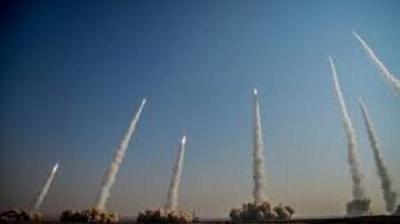Political-Executive Board of the Left Party of Iran
On January 16, 2024, the Islamic Republic of Iran's Revolutionary Guards attacked Erbil, the center of the Iraqi Kurdistan Region, with eleven missiles. As a result of this missile attack, the residential house of an Iraqi Kurdish merchant, Pishro Dizaei, was targeted, killing five people and injuring a number of other family members of this wealthy merchant. At the same time, in the morning of the same day, several ballistic missiles were fired from Khuzestan towards Idlib in Syria under the pretext of retaliating against ISIS operations in Kerman. The Hay'at Tahrir al-Sham (HTS) group, which is an Islamic movement opposed to Bashar al-Assad's government, is present in this region. In the evening of the same day, the Iranian regime attacked Jaish al-Adl in Kouh-Sabz area near Panjgur city in Baluchistan, Pakistan, with missiles and drones.
While condemning this attack, the Iraqi government has announced that it will take the case to the United Nations against the Iranian regime. The Syrian government has remained silent in this regard and, as in the past, has left the Islamic Regime's hand open for military action in Syria. But the government of Pakistan has reacted sharply. In addition to condemning the Islamic Republic, Pakistan summoned its ambassador and announced to Iran's ambassador in Pakistan that he has no right to return to Pakistan at the moment, and the government of Pakistan has retaliated by attacking Saravan with missiles. As a result of this attack, several women and children have been killed.
Why the Islamic Republic has embarked on this adventure, especially in the case of Pakistan, more information is needed. But the Islamic Republic has been under pressure from a part of the forces within it for a long time, especially after the escalation of the war in Gaza, due to the refusal of direct participation in this war.
Missile attacks, especially on Iraq and Pakistan, in addition to the escalation of tension and the risk of expanding the scope of the war, will not only achieve nothing for the Islamic Republic, but will end up making it more isolated in the region, to the benefit of America and Israel. The main loser of these adventurous actions will be the Islamic Republic itself. These actions will affect the commercial and economic relations between Iran and Iraq and lead to an increase in stagnation.
Over several decades, under the pretext of fighting Israel and liberating Palestine from occupation and by spending heavy expenses, the Islamic Republic has always tried to achieve its expansionist, interventionist and reactionary goals in the region with harsh slogans against Israel and unreserved support to movements such as Hezbollah of Lebanon, Hamas of Palestine, Hashd al-Shaabi and its aligned forces in Iraq, the Houthis of Yemen, and the Syrian government. The aggravation of the crisis in Iran and the escalation of Israel's war with Hamas and Palestine and the announcement of the West's support for Israel, led by the United States, have put the Islamic Republic in a weak position to provide practical support to Hamas and the so-called "Axis of Resistance".
The brutal killing of the Palestinian people during these three and a half months of war, the assassination of important figures and several senior commanders of the IRGC Quds Force in Syria, the assassination of the political deputy of Hamas, Saleh al-Arouri in Lebanon, the US and British military attack on the Houthis and the destruction of more than a quarter of their military capabilities and the existence of a multitude of different crises and widespread general dissatisfaction with the regime have put the Islamic Republic in a weak position. In addition to these, in such a situation, the bombing in the ceremony of the fourth anniversary of the assassination of Qassem Soleimani was a blow and a failure that fueled the further humiliation of the regime and the questioning of the effectiveness of the regime's security institutions, and showed, despite the intensification of internal repression, how the Islamic Republic is vulnerable in terms of security.
The Islamic Republic, especially Ali Khamenei, who in the past has always attacked the United States with slogans and ranting, is more desperate than he can claim to support Hamas and take direct action in the Israeli-Palestinian war. Even in Khamenei's speech towards America, changes were made and soft speech replaced rants and exaggerations. He wanted to hide this weakness with noisy actions and to prevent the decline of his past position among the forces of the "Axis of Resistance" at a low cost. Threats and claims of severe revenge from ISIS and Israel led to the firing of several rockets at a Kurdish merchant's house in Iraq and claiming it was a Mossad base and launching rockets at the HTS group in Idlib, Syria, and calling it one of the leadership centers of ISIS.
The purpose of missile and drone attack on Pakistan to hit Jaish-al-Adl is not clear. Despite the ups and downs, the Islamic Republic has had a relatively friendly and non-hostile relations with the government of Pakistan. In the past, especially in connection with security issues, there has been cooperation between these two countries.
The Left Party of Iran considers the missile attack on Syria's Idlib, Iraq's Erbil and Pakistan's Kouh-Sabz to be a violation of the territorial integrity of these countries and strongly condemns it. These measures lead to the escalation of tension in the region and harm the security and national interests of Iran. Undoubtedly, these adventurous attacks cannot save the Islamic Republic from the crisis it is facing in its relations with the outside world. In the country as well, people have turned away from this authoritarian and repressive regime and its policies for a long time. The final solution to end these costly and dangerous adventures and repressive measures is to bring down the Islamic Republic.
Political-Executive Board of the Left Party of Iran
January 18, 2024

Add new comment